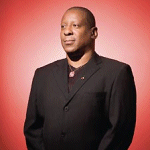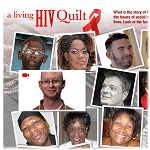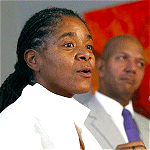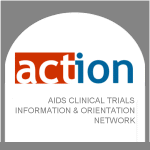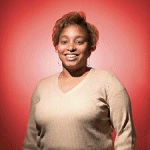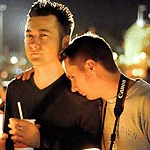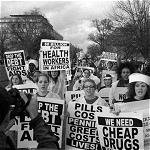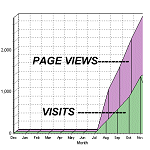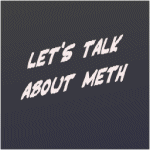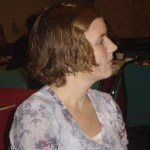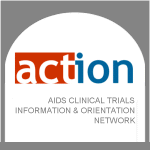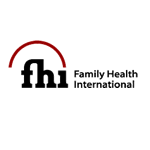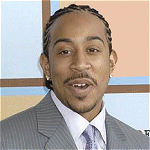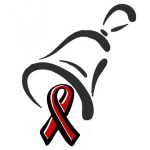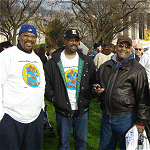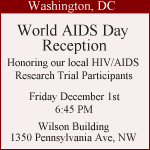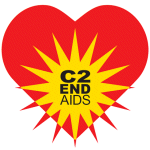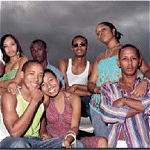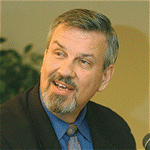
IT WAS 1980 in New York City and Mark Fischer was walking into the legendary nightclub, The Saint, on opening night. Having moved to D.C. from North Carolina two years earlier, when STDs were the scariest health concern in the gay community, life was good for this young man.
''I went to visit some friends and they took me as a surprise. I thought I'd died and went to heaven. It was overwhelming, all encompassing. It was a place you went with friends, and just sort of lost yourself in the music and danced.''
Trips to The Saint were the ''carrot at the end of the stick'' that got Fischer through whatever toil he faced during the workweek.
''It was like going to church. In some ways, it was this spiritual communion.''
The Saint remained a constant bright spot in Fischer's life, from the day it opened until its closing in 1988. In those years, Fischer transformed from a young gay man celebrating an unprecedented era of liberation, to someone living with HIV in the opening years of a global pandemic. In a sense, the party was over. But Fischer managed to hold onto a pragmatic sense of calm.
''I was diagnosed in '86. I assume that I was infected probably before that. I limited my activities severely, because I wasn't sure. It was a very stifling kind of thing.''
Fischer says there initially wasn't much reason to get tested for HIV, as there wasn't any treatment on offer. But by the time he and his partner, whom he'd met in 1984, were tested, it was just a matter of confirming what they'd already assumed. The security of his relationship and the dawning of HIV medications, he says, made the test results quite a bit easier to swallow.
Fischer can't say the same for some of those medicines he's ingested over the years, a root-beer-flavored syrup in particular.
''The worst part was that it would repeat. It would keep coming back. And it tasted like, I don't know, rancid fish. Then I got capsules, but they still had a tendency to do a little bit of that.''
That may have contributed to Fischer's admitted problem with taking his medications regularly -- until recently he had been ''sloppy compliant'' with his regimens, taking frequent ''drug holidays.''
The primary reasons, he explains, were complicated schedules for dosing his myriad medications, and side effects, such as ongoing nausea, bloating and severe gastrointestinal discomfort. But when an HIV-positive friend went blind and deaf, he found the motivation to stick to the medications that would keep cytomegalovirus, which can attack a compromised immune system, at bay.
Still, Fischer's difficulties with his medications -- and other contributing factors -- led to his being hospitalized with pneumocystis pneumonia in November 2002. It was one of many hardships Fischer has faced in recent years, including losing a job and the death of his partner.
Today Fischer, 57, is regaining solid footing.
''I'm getting over the feeling that I'd really fucked my life up for good because so many negative things hit. I kept thinking, 'If only....' But I had this realization that doing the best I could, this is where I wound up. The void in my life -- the job, the partner -- is an opportunity to rebuild parts of my life that very few people get to rebuild. I can be selective of what I put in there. Now I'm looking at life differently. It's the same thing with the HIV. It all goes together. Now I see challenges as opportunities.''
Fischer is also on a new drug regimen that has him taking four medications, but all at the same time every morning, with few side effects. He's supplementing the pharmaceuticals by seeing a nutritionist, an acupuncturist and a massage therapist.
''The feedback I've gotten has reinforced to me that I'm healthy, all things considered.''
Professionally, he's managing an organization he founded, Values in Action (VIA), with the aim of strengthening ties between the business and non-profit communities. He also expects to be partnered again, at some point.
He says HIV and other hardships have taught him not to defer life.
''I find myself sharing experiences with my parents, having far more in common with them than I would ever expect to. It's the experience of having your friends, peers, die away in large numbers. It's looking for things in your environment, your community, that you once had that you can't find.
''Dealing with the disease has caused me to approach life differently. For the most part, I'd say I've been able to find a positive outcome. I've been reminded of what is important, how I should spend my time, not to think so much about the future.... You need to withdraw some of your savings, literally and figuratively. You need to withdraw and spend now, because there's no guarantee.''
Read the Complete Article at the Metro Weekly Website
 From the Washington Post: In late August, barely a month into her new job, Marie Sansone of the District's AIDS agency was astounded by what she discovered: five boxes of unexamined HIV and AIDS cases that had not been touched in more than a year.
From the Washington Post: In late August, barely a month into her new job, Marie Sansone of the District's AIDS agency was astounded by what she discovered: five boxes of unexamined HIV and AIDS cases that had not been touched in more than a year.

